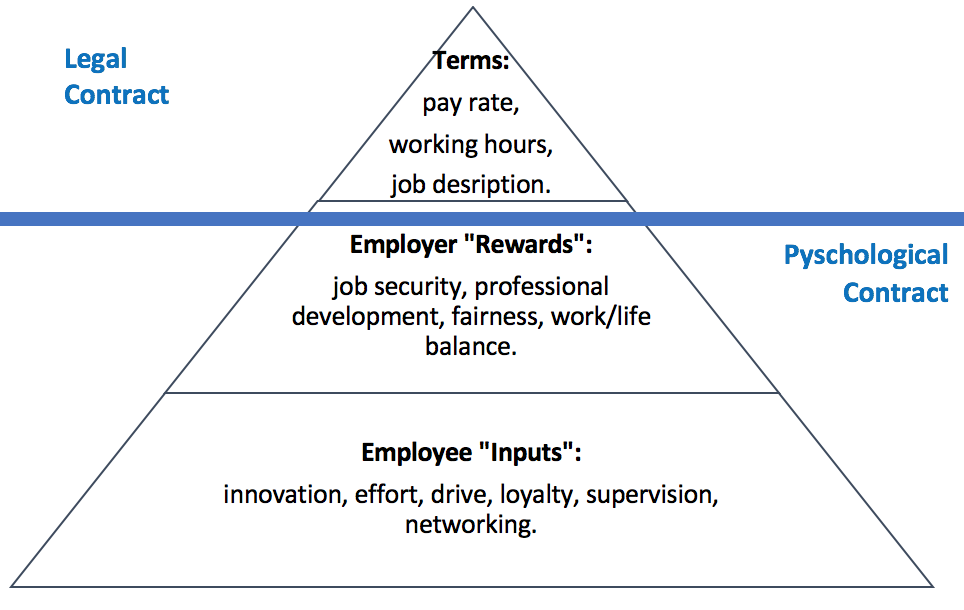As published in the Otago Daily Times on 8 June 2020
Redundancies are generally made to save a business financial cost but they add a human cost – for business leaders who must make people redundant, for team members who must leave and for those who may stay. In the current economic climate, it is likely that we know at least one person from one of these groups. Legal contracts between employers and employees stipulate the process to be followed, but what their pyschological contracts require is less clear. Because restructures have such an emotional toll on everyone involved, we need to be mindful of both types of contracts.
Legal Contracts – The Tip of the Iceberg
A psychological contract is different to a written legal contract - it represents the notion of 'trust' or 'understanding' that employees feel they have with their employer. If you look at the relationship between an employer and an employee as an iceberg, a legal contract is the tip which is clearly visible above water. The pyschological contract represents the larger parts of the iceberg under water which you can’t see and can’t fully fathom - but you know they are the foundation of the relationship.

As an employee, you balance what you put into your job (like effort and ideas) against what you feel your boss is rewarding you with (like recognition and professional development). If you put in more than you get back, the balance is off and the psychological contract is broken. You may then become disengaged and do poor work. Fairness and job security are also expected by employees so when a business is restructured, psychological contracts are in danger.
Redundancy can feel like a form of identity theft. Whether we like to admit it, for many of us we are “what we do”. It’s a pretty common conversation starter to ask “what do you do for a living?” Many surnames originate from our ancestors’ line of work – Taylor, Baker, Smith. Those of us who are business leaders take pride in running a successful operation with an engaged team. While those of us who are employed may not love our jobs, we generally earn a sense of place and achievement from them.
Be Visible and Open
Communication is crucial for businesses to move forward after redundancies. Textbooks will tell business leaders to develop a clear and simple communcation strategy. Deliver it consistently, first to their internal audience, then to external stakeholders. If you are a business leader who is struggling with your decision to restructure, you may want to withdraw and hide behind a process outlined by your HR or legal advisors. However for your pyschological contracts to be repaired, you need to be visible, be ready to listen and to help.
Tune In and Ask
Research shows that many employees who remain in your business suffer from “survivor guilt”. They are likely to mistrust management which leads to them becoming demotivated. They can become overwhelmed by extra workload. Textbooks will tell you to consider engagement strategies such as ensuring staff are appropriately trained to take on new duties and to run team building exercises. However to save your pyschological contracts, it is time to double down on the engagement strategies that suit your team – ask them what they need and what they want.
Commit For The Future
In these uncertain times, you should show commitment to those who leave and those who stay. We have a limited pool of talent in New Zealand so it will pay to be supportive of valued staff who are made redundant in case you need to work with them in the future. For example, you could offer counselling or advice on how to upskill. You could also think about other ways of how to keep them engaged with your business (or your wider industry) by encouraging them to set up as independent contractors or consultants.
Psychological Contracts - Mutual Understanding
Although it is important that ex and continuing team members are looked after, those of us who are business leaders should also remember to take care of ourselves. It is a stone cold human who makes restructuring decisions lightly and is not affected by the related stress. It takes two to make a pyschological contract so those of us who are continuing employees need to understand the employer’s perspective as well. Both parties need to build resilience so they can help their business outlive the current economic challenges. The bottom line is that while we need to follow the legal processes and textbooks, we also need to remember that we are all human. We have been lucky in New Zealand to avoid the physical human cost of Covid19 but we still need to overcome the financial and emotional costs it has caused.


